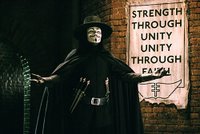
The dystopian science fiction movie V for Vendetta just may become one of those touchstone films that defines a moment in time. Some of the key sociopolitical tremors of today are here: fear as a method of political control; media centralization and its effects on the contraction of thought; the thinly-shaded line between ‘freedom fighter’ and ‘terrorist’ and the government’s use of the latter label to promote its own agenda; the staging of atrocities by a government on its own citizens to seize power; the narrowing of debate and suppression of opposing ideas; and the stifling of art, literature, and music as a method of thought control.
With ideas, images, and emotions blended and compressed into an incendiary mix, V for Vendetta is an explosive and thought-provoking film of political thought and personal awakening. Set in an imaginary future totalitarian Britain, the film’s story involves Evey (Natalie Portman, in one of her best roles) being saved from rape at the hands of the state police by masked revolutionary/anarchist V (Hugo Weaving). V wears the mask and costume of Guy Fawkes, one of the Roman Catholic conspirators who attempted to blow up the Houses of Parliament on the fifth of November in the Gunpowder Plot of 1605. His life is dedicated to bringing down Britain’s fascist tyranny, and Evey is swept up in his crusade, as is police inspector Finch (Stephen Rea), who doggedly tracks down the ‘terrorist’ V and his ‘accomplice’ Evey.
In terms of structure, V for Vendetta is essentially a three-character story--V, Evey, and Finch--with the latter two characters undergoing profound transformations over the course of the film. To a certain extent V begins and ends the film an enigma, though we do discover something of his history and motivation, which drives the narrative in the midsection of the story. Though somewhat odd at first, V’s mask comes to almost look like it’s emoting by the last third of the film. Weaving, best known for his work in two fantastic trilogies--Matrix and Lord of the Rings--does an admirable job of breathing life into the mysterious character. V himself is morally ambiguous, his acts neither applauded nor condemned, and you are left to consider how people, organizations, and governments rationalize acts of violence in the name of some higher goal.

Though it’s a very political thriller, V for Vendetta is filled with humanistic touches that portray the personal costs of fascism, institutionalized fear, and violence by the state. The story, which Evey uncovers, of a political prisoner who is jailed and tortured because of her sexual orientation is particularly moving (“I remember when words changed their meaning. When ‘different’ became ‘dangerous.’”). Another interesting and sympathetic character is executed because they possess banned literature.
Intelligent, provocative, and consistently engaging, V for Vendetta is an uncompromised, unsettling, searing screen capture of the zeitgeist.
---
Directed by James McTeigue
Written by Andy Wachowski & Larry Wachowski
Based on the graphic novel by Alan Moore & David Lloyd
Natalie Portman....Evey
Hugo Weaving....V/William Rookwood
Stephen Rea....Finch
Stephen Fry....Deitrich
John Hurt....Adam Sutler

No comments:
Post a Comment